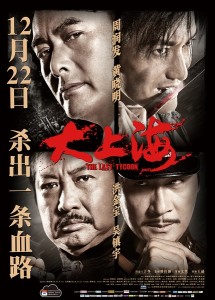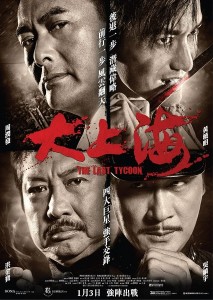The Last Tycoon
大上海
Hong Kong/China, 2012, colour, 2.35:1, 119 mins.
Director: Wang Jing 王晶 [Wong Jing].
Rating: 9/10.
Superbly tooled piece of popular entertainment centred on 1930s Shanghai crimelords.
Shanghai, 1940. Onetime crime boss Cheng Daqi (Zhou Runfa) has returned from exile in Hong Kong to the Japanese-occupied city, where he is feted prior to a Beijing Opera performance. He remembers growing up as a young man (Huang Xiaoming) in nearby Chuansha, Jiangsu province, where in 1913 he had loved wannabe opera performer Ye Zhiqiu (Feng Wenjuan). She had dreamed of studying in Beiping [modern Bejing] while he had dreamed of making it in the “adventurer’s paradise” of Shanghai. Before they were separated, he had promised he would come to find her in Beiping. After being falsely accused of his boss’ murder, Cheng Daqi had been rescued from jail by shadowy Nationalist Army officer  Mao Zai (Wu Zhenyu), who told Cheng Daqi to look him up in Shanghai. By 1937, Cheng Daqi had achieved his dream of owning The Grand Shanghai theatre and being one of the city’s crimelords. On his way to the top, he had met smalltime gangster Lin Huai (Gao Hu), now his trusted sidekick, and street singer Bao (Tong Fei), now his wife (Mo Xiaoqi). While welcoming his amanuensis, veteran crimelord Hong Shouting (Hong Jinbao), to his theatre on the latter’s 60th birthday, he had been taken aside by Mao Zai, now a general, and asked to get hold of a secret list of underground spies in the possession of well-known scholar Cheng Zhaimei (Xin Baiqing), who’d just arrived from Beiping with his wife. As Cheng Daqi well knew, Cheng Zhaimei’s wife was Ye Zhiqiu, now a famous Beijing Opera star.
Mao Zai (Wu Zhenyu), who told Cheng Daqi to look him up in Shanghai. By 1937, Cheng Daqi had achieved his dream of owning The Grand Shanghai theatre and being one of the city’s crimelords. On his way to the top, he had met smalltime gangster Lin Huai (Gao Hu), now his trusted sidekick, and street singer Bao (Tong Fei), now his wife (Mo Xiaoqi). While welcoming his amanuensis, veteran crimelord Hong Shouting (Hong Jinbao), to his theatre on the latter’s 60th birthday, he had been taken aside by Mao Zai, now a general, and asked to get hold of a secret list of underground spies in the possession of well-known scholar Cheng Zhaimei (Xin Baiqing), who’d just arrived from Beiping with his wife. As Cheng Daqi well knew, Cheng Zhaimei’s wife was Ye Zhiqiu, now a famous Beijing Opera star.
REVIEW
A superbly tooled piece of big-budget popular entertainment that melds China money and production values with Hong Kong film-making versatility, The Last Tycoon 大上海 packs enough material for a much longer gangster epic into a densely narrated but utterly involving two hours. Cast in strength with Mainland and Hong Kong actors at the top of their game, it’s a tribute to the sheer professionalism of prolific director-writer-producer 王晶 Wang Jing [Wong Jing] and producer-d.p. Liu Weiqiang 刘伟强 [Andrew Lau] that the whole thing also works at an emotional level rather than being just another routine Shanghai mobster story. Much of that is due to the screenplay by veterans Wang and Wen Jun 文隽 [Manfred Wong], plus Lv Guannan 吕冠南 (who wrote Liu’s odd-couple romantic drama A Beautiful Life 不再让你孤单, 2011), which not only clicks satisfyingly into place without rushing its third act but also provides opportunities for both veterans and younger players to shine individually.
The writers have freely based the story on notorious characters of the 1920-40s, with the Shanghai godfather Cheng Daqi played by Zhou Runfa 周润发 [Chow Yun-fat] recalling the legendary Du Yuesheng 杜月笙, the crimelord of Hong Jinbao 洪金宝 [Sammo Hung] standing in for Huang Jinrong 黄金荣, and the Nationalist general of Wu Zhenyu 吴镇宇 [Francis Ng] blending elements from the city’s third godfather, Zhang Xiaolin 张啸林, and from Dai Li 戴笠 , the intelligence chief of Jiang Jieshi 蒋介石 [Chiang Kai-shek]. (Elsewhere in the story, the fine rendition by actor Gao Hu 高虎 of Zhou’s sidekick has elements of the real-life Lin Huaibu 林坏部, who assassinated Zhang, while the female lead of Yuan Quan 袁泉 is seemingly inspired by Beijing Opera star Meng Xiaodong 孟小冬, played by Zhang Ziyi 章子怡 in Forever Enthralled 梅兰芳, 2008.) It’s not necessary to realise any of this to enjoy the movie, and by changing the characters’ names the writers have been able to invent a completely fictional narrative. But the resonances remain for anyone who cares to spot them, further adding to the film’s depth.
Zhou has grown immensely in screen stature since hitting his 50s (Curse of the Golden Flower 满城尽带黄金甲, 2006; Confucius 孔子, 2009; The Assassins 铜雀台, 2012) and, though his playing here of godfather Cheng Daqi lacks the chilling ruthlessness of his mobster in Shanghai (2010), it’s a rounded, thoughtful performance that capitalises on his Cheshire Cat smile. Making real screen impact as the ambitious younger Cheng Daqi is Mainland star Huang Xiaoming 黄晓明, for whom the past year has been a banner one creatively (An Inaccurate Memoir 匹夫, 2012; The Guillotines 血滴子, 2012), while his compatriot Yuan, last seen in fluffy rom-com My Ex-Wife’s Wedding 跟我的前妻谈恋爱 (2010), brings real pathos to the role of Cheng Daqi’s love-of-his-life, Ye Zhiqiu. In her few scenes, newcomer Feng Wenjuan 冯文娟 is suitably winsome as the younger Ye Zhiqiu, while Mo Xiaoqi 莫小棋 effectively dials down her usual vampiness as Cheng Daqi’s wife.
The movie is driven, however, by its lead Hong Kong trio of Zhou, Hong and Wu. Hong and Zhou spark well together, like two veteran pals, but it’s Wu who brings a tenebrous edge to the whole drama as the KMT nasty who’s an omniscient presence in Cheng Daqi’s career, the self-professed “owner” of his life after saving him from a murder charge. Not for the first time, Wu’s performance is the one that lingers when the lights go up.
The Last Tycoon never pretends to be more than well-crafted entertainment, and on a technical level it’s certainly that. Widescreen camerawork by Liu and Guan Zhiyao 关智耀 [Jason Kwan] (Love in the Buff 春娇与志明, 2012; Cold War 寒战, 2012) makes much play with light and shadow; production and costume design are lavish to a fault; and editing by Hong Kong’s Zhong Weizhao 钟炜钊 [Azrael Chung] packs in the most without ever seeming over-rushed. The mournful, nostalgic score, with plaintive trumpet, by Chen Guangrong 陈光荣 [Comfort Chan] is a plus in binding the whole film together as its flashes forward and back in the lives of the protagonists; and action and effects, especially for the 1937 boming of Shanghai, are gripping.
The Chinese title literally means “Big Shanghai”, and is also the name of Cheng Daqi’s landmark theatre, The Grand Shanghai.
CREDITS
Presented by Bona Film Group (CN), Bona Entertainment (HK). Produced by Mega-Vision Pictures (HK).
Script: Wang Jing [Wong Jing], Wen Jun [Manfred Wong], Lv Guannan. Photography: Liu Weiqiang [Andrew Lau], Guan Zhiyao [Jason Kwan]. Editing: Zhong Weizhao [Azrael Chung]. Music: Chen Guangrong [Comfort Chan]. Songs: Chen Zhiyi. Production design: Xi Zhongwen [Yee Chung-man]. Art direction: Lin Ziqiao. Costume design: Dai Meiling, Chen Ziwen. Sound: Zeng Jingxiang [Kinson Tsang]. Action: Li Dachao. Visual effects: Huang Hongda.
Cast: Zhou Runfa [Chow Yun-fat] (Cheng Daqi), Huang Xiaoming (younger Cheng Daqi), Hong Jinbao [Sammo Hung] (Hong Shouting), Wu Zhenyu [Francis Ng] (Mao Zai, general), Yuan Quan (Ye Zhiqiu), Yuan Li (Ling Husheng, Hong Shouting’s wife), Mo Xiaoqi (Bao, Cheng Daqi’s wife), Xin Baiqing (Cheng Zhaimei, Ye Zhiqiu’s husband), Gao Hu (Lin Huai), Kurata Yasuaki (Nishino, major general), Tong Fei (younger Bao), Feng Wenjuan (younger Ye Zhiqiu), Han Zhi (Lu Yongxiang, Zhejiang province military governor), Zheng Yitong (Lu Lanchun, Beijing Opera star), Du Yiheng (Lu Xiaojia, Lu’s son).
Premiere: ScreenSingapore (Opening Film), 4 Dec 2012.
Release: China, 22 Dec 2012; Hong Kong, 3 Jan 2013.
(Review originally published on Film Business Asia, 23 Jan 2013.)
